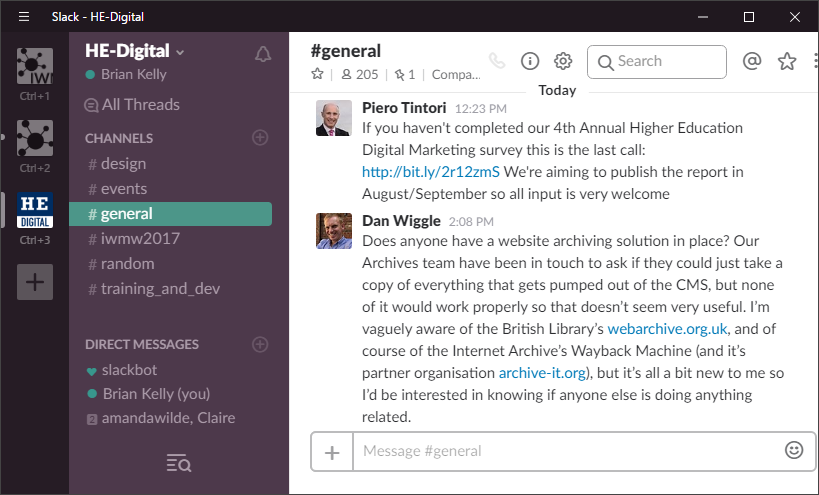A Communications Infrastructure for the UK HE Digital Community
 At the recent IWMW 2017 event I facilitated a session on “A Communications Infrastructure for the UK HE Digital Community“. The aims of the session were simple:
At the recent IWMW 2017 event I facilitated a session on “A Communications Infrastructure for the UK HE Digital Community“. The aims of the session were simple:
- What do we need from communication tools (especially tools used for communications. beyond the institution)?
- What alternatives to mailing lists are there?
- What are the strengths and weaknesses of alternatives?
- Do we need a communications framework?
If there is agreement that we do need an infrastructure for communications across the UK HE’s digital community::
- What should the infrastructure cover?
- How will it be implemented?
Outcomes
As the session encouraged broad discussions on this topic we did not necessarily arrive at a tangible infrastructure for communications across the community to replace the Jiscmail lists which served the community well in the 1990s but are now little used. Indeed as one of the participants commented:
I think it was a little ambitious to hope to have a fully fledged communications strategy by the end of this session, but I think we made a good start, and I’m thinking bigger picture as a result.
However the session was valuable in helping to address a number of relevant issues.
There was agreement that we were a community which had shared values and goals, although it was acknowledged that is was difficult to define the community (this led to questions such as “Is IWMW a community or was it an event?” and “Does IWMW exist outside the annual event and, if so, how should that existence outside the event manifest itself?“.
 I referred to the Wikipedia’s definition of a Community of Practice which I used my Welcome to IWMW 2017 talk:
I referred to the Wikipedia’s definition of a Community of Practice which I used my Welcome to IWMW 2017 talk:
- A community of practice (CoP) is a group of people who share a craft and/or a profession.
- A CoP can evolve naturally because of the members’ common interest in a particular domain or area, or it can be created deliberately with the goal of gaining knowledge related to a specific field. It is through the process of sharing information and experiences with the group that members learn from each other, and have an opportunity to develop personally and professionally. …
- Communities of practice are not new phenomena: this type of learning has existed for as long as people have been learning and sharing their experiences through storytelling.
The IWMW event provides a community of practice which has been created deliberately (through the work of the event`s advisory group) as well as supporting the natural evolution of sharing experiences through the more informal aspects of the event.
A simple pledge giving the individual`s perspective on the community had been prepared for the session:
I do not work in a silo – I am a member of a community – the web/digital managers community in higher education. We have shared values and goals.
In order to realise these goals I will work collaboratively with my peers. I will share experiences. I will ask for help and I will help others.
This had some parallels to the pledge for supporting Open Principles for Science and Education for building a better world for everyone which was shared yesterday on the OPENEDsig Jiscmail group:
I believe Science is a public good and quality education opportunities should be open and accessible for everyone.
I will work to eliminate the digital divide and contribute to building up Open Knowledge for the benefit of all humanity, with special effort to enlighten future generations.
I contribute my service for the betterment of all humanity using the guiding principles of the United Nations 2030 Agenda for Sustainable Development in building a better world for everyone.
I will work to advance and increase Open Knowledge for the benefit of all humanity with special consideration of those less fortunate.
I will be a voice for Open Principles in Science and Education and promote this pledge through my networks.
However we did not discuss this pledge in any detail. Rather in the session the participants split into two groups and outlines outlined possible tools and services which could be used by the community, as well as exploring other community-led approaches such as regional activities and sharing of resources.
Tools, Services and Approaches
The tools, services and approaches which were discussed included:
Mailing lists: Mailing lists such as web-support and website-info-mgt have been widely used in the past, but now seem to be little used, and primarily for announcements.
Actions:
- Clarify role and purpose of existing mailing lists and ensure the current role is documented.
Use of Blogs: People are willing to participate, but don’t always like a blank canvas. There was a suggestion that people could provide titles of blog posts they would like to read. Then people would be invited to take one of these titles and – where relevant – write a post on that subject. This approach might be particularly valuable for encouraging new attendees to join in.
Actions:
- Create means of collecting blog post titles – perhaps tweets with relevant hashtag, share the titles so they can be checked off once picked up.
- Explore approaches taken by the Digital Communications Team Blog at the University of St Andrews.
- Explore possibility of hosting a centralised blog for the community, for those who did not wish to provide their own blogging service.
Microblogs: Some people make intensive use of tools such as Slack and Twitter within their institution. However others are concerned about the long-term persistence of such services and possible changes in the terms and conditions governing use of such services (e.g. introducing charges). If such tools were to be used by the community, the risks of using the tools should be flagged.
Actions:
- Explore further use of he-digital Slack group.
- Ensure risks of using such services are documented.
Professional networking services: Most of the participants at the master class were members of LinkedIn, although there seemed to be little involvement in LinkedIn groups.
Actions:
- Revisit promotion of UK HE Web Professionals LinkedIn Group.
- Ensure community is aware of how LinkedIn can be used to connect with peers.
Personal communications: We want to encourage one-to-one discussion, but it’s not always clear where to go or how to find people. Slack has people listed by name, so can identify people there. However would be great if people could be found by category of expertise, eg: IT, UX, Marketing. To be able to find appropriate people to contact. Some information can be found for speakers on the IWMW 2017 website.
Actions:
- Identify channels which could be used for one-to-one contacts. Slack might be useful for this.
- Encourage IWMW 2017 participants to make their attendance at the event known on the IWMW 2017 Lanyrd entry, so their professional contact information can be found by their peers.
- Ensure community is made aware of the value (and possible risks) of making contact with one’s peers using LinkedIn.
- Encourage delegates to follow-up their attendance at IWMW 2017 by making personal contact with fellow delegates (e.g. by email, phone call or face-to-face meeting).
Sharing resources: If members of the community were willing to share appropriate resources, written for their institutions or otherwise, they could (with Creative Commons licences) be shared with the IWMW community. These could also be tagged and categorised so that resources on specific topics or themes could be identified.
Actions:
- Find appropriate resources, apply CC licensing, and share using services such as Slideshare.
Regional activities: Institutions are in a relatively unique situation, would want to arrange regular meetups, to be seen as part of the membership benefits. Subject areas which could be covered in regional meetings might include data protection changes in May 2018; SEO best practice; Googler Analytics and using data, XcriCap and UCAS data and how this ties in with CMA
Actions:
- Liaise with groups such as Scottish Web Folk for advice on this setting up. [Note Duncan Ireland, University of Highlands and Islands, wrote a post on the IWMW blog entitled “The Life and Times of the Scottish Web Folk Regional Group” which was published in April 2016].
Governance Issues
There can be risks that if online communities were simply set up with no governance that the services could fail to be used (if use wasn’t promoted) or would be used inappropriately if guidelines on acceptable use weren’t provided). It was therefore felt there was a need to explore simple approaches to governance and acceptable use policies for online community services.
Conclusions
At this year`s IWMW event 41% of the participants were attending their first IWMW event and 43% had attended between 1 and 5 events previously. This suggests that there has been significant changes in the digital community during the life of the IWMW event. It is therefore timely to revisit the communications infrastructure for the community. The master class described in this post helped to identify possible approaches for use by the sector which can help to support the UK’s HE digital community.
Note the slides used in the session are available on Slideshare and embedded below:


